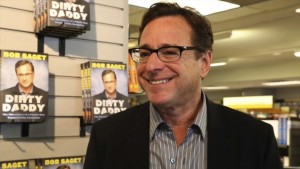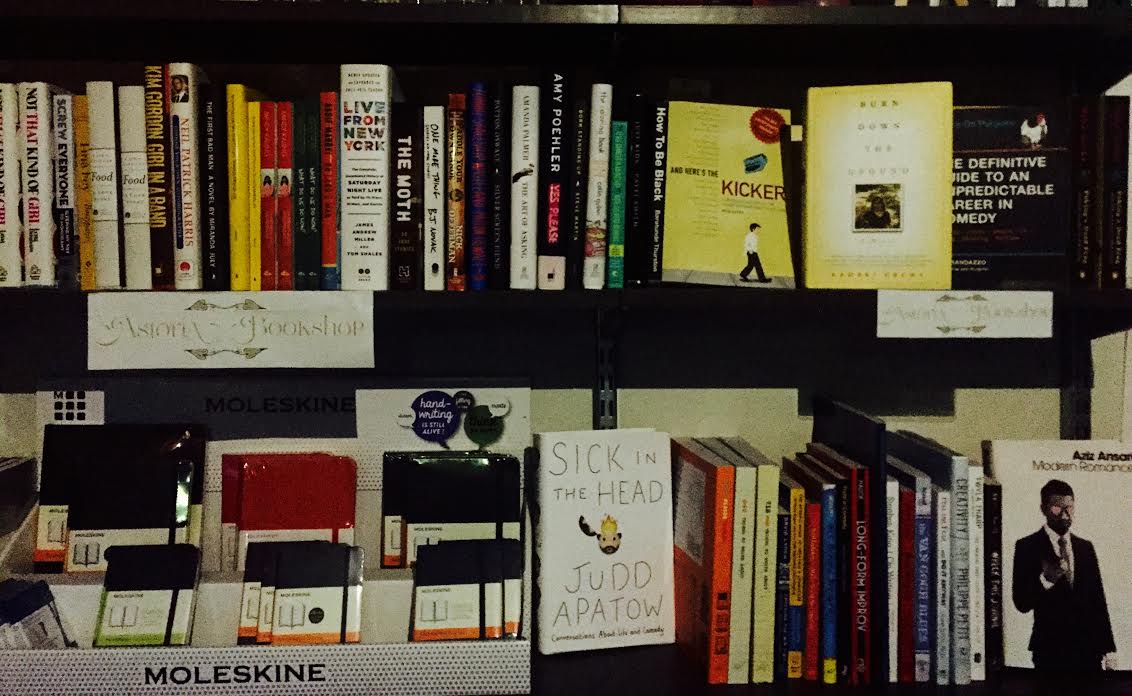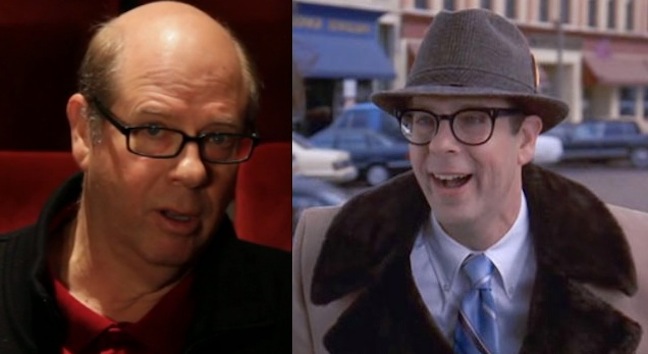Why are there so many more books by comedians about their lives as comedians than seemingly ever before?
Perhaps it’s another sign of boom times.
The usual gimmicky joke books for bathroom reading, Dave Barry columns and newspaper comic-strip collections have had to make space over the past few years in the comedy section of your local bookstore, which has blossomed with an array of memoirs from comedians.
When Steve Martin’s “Born Standing Up” came out in 2008, it was still a wild and crazy idea for a comedian to tell his or her story to starkly in book form. Other A-list comedians had books — George Carlin, Jerry Seinfeld, Bill Cosby and Paul Reiser, among those in the 1980s and 1990s — but they often served as a different avenue for selling the stage act. Jokes and sitcoms in book form.
“And sometimes they still are,” Bob Saget told me last year, while promoting his own book, “Dirty Daddy.”
Since then, the field has grown exponentially and more personally. Judd Apatow released a collection of in-depth interviews with comedians earlier this summer. Aziz Ansari and Lena Dunham cashed in lucrative deals for advice books. Mindy Kaling’s second book comes out this month. Jim Gaffigan has hit the best-seller list twice already. Ditto, Artie Lange. Chelsea Handler, even more times. Billy Crystal, Amy Poehler, Tina Fey, Martin Short, Russell Brand, Sarah Silverman, Rachel Dratch, Marc Maron, Todd Glass, Tim Reid and Tom Dreesen, Paul Reiser, multiple books from Artie Lange, Rob Delaney, Carol Burnett, Carl Reiner, Tim Conway, Darrell Hammond, Tracy Morgan, Mike Birbiglia, Jen Kirkman, Fred Stoller, Jim Norton, Lisa Lampanelli, Roseanne Barr, Greg Fitzsimmons, Heather McDonald, Sarah Colonna, Moshe Kasher, Chris Gethard, Dave Hill, Patton Oswalt, Ophira Eisenberg, Selena Coppock, Miranda Sings, Felicia Day, Grace Helbig, Mamrie Hart, Chris Hardwick, Nick Offerman, Saget and more. Not to mention the books about comedy or biographies written by others about comedians, although I just did mention them.
What do you attribute to the rise in memoirs by comedians?
Comedic storyteller Kambri Crews wrote her own memoir “Burn Down The Ground” and a year ago, opened a venue in Astoria, Queens — Q.E.D. — that’s a performance space, adult learning center and also bookstore (the Q.E.D. selection in late July is pictured above). Crews previously had opened a second performance space in the former Comix comedy club in Manhattan.
“Comedians have strong points of view and generally aren’t worried about being politically correct in lieu of authenticity,” Crews told The Comic’s Comic. “Perhaps most importantly, they also come with a built-in following (a “platform” to use a buzzword in the publishing business). With fewer book deals being doled out, this is a top priority for publishers who need to know that the book will sell.”
Technology and social media certainly have influenced and spurred on this current boom in stand-up comedy, both on stages and online via YouTube and podcasting. Saget told me that’s part of what’s fueling more memoirs from comedians, too.
 “I think the world as you know, as we all know, has changed significantly. I mean, the podcast has taken over for that way of talking,” Saget told me. “People want to hear humans speak. They want to hear people being more real. They don’t want to hear a person just spewing out what they’ve already manufactured, what they’ve heard from them before. I think it’s all the sophistication that we’ve seen from the people who – the Woody Allen, Larry David mindset of how are things really? What are we experiencing? So a comedian is a person who explores life, and looks, and they’re outsiders. And they can be happy. But, in John Leguizamo’s book, as he said, they could be tortured. I think people welcome it now. That’s why there’s so many great podcasts and so many brilliant people doing them, that are all the way from Chris Hardwick to Marc Maron – half of my favorite comedians – Jim Jefferies, have podcasts. Same thing has definitely filtered into the written word. We want real honesty.”
“I think the world as you know, as we all know, has changed significantly. I mean, the podcast has taken over for that way of talking,” Saget told me. “People want to hear humans speak. They want to hear people being more real. They don’t want to hear a person just spewing out what they’ve already manufactured, what they’ve heard from them before. I think it’s all the sophistication that we’ve seen from the people who – the Woody Allen, Larry David mindset of how are things really? What are we experiencing? So a comedian is a person who explores life, and looks, and they’re outsiders. And they can be happy. But, in John Leguizamo’s book, as he said, they could be tortured. I think people welcome it now. That’s why there’s so many great podcasts and so many brilliant people doing them, that are all the way from Chris Hardwick to Marc Maron – half of my favorite comedians – Jim Jefferies, have podcasts. Same thing has definitely filtered into the written word. We want real honesty.”
Do you think it took podcasting to get the book publishing industry more interested in memoirs from comedians?
“I think in general the arts are evolving. It used to be, ‘Oh, he’s a singer/songwriter?’ It’s like Inside Llewyn Davis. What is the thing that differentiates someone? They’re not just singing. They’re not just writing. They have to do both. Everybody has to do everything. See, you got a performer that can play 10 instruments and writes all the music and does all of the arrangements. The same is true of what’s required – because there’s so many options for people now – a voice has to speak to them. So, I had no choice. I needed to work on myself so much. Through my self-work and then I got to continue to do performing and this writing thing just organically happened. And I love the acquired style that new comedians have even onstage, which isn’t joke-joke-joke, and I like that, too. I like people that do that. But there’s more of a self-awareness to it. There’s more of a thoughtful spoken word type of stand-up that the idea is you can feel who they are as a person.”
Writing the book changed your voice comedically opened it, too?
“I’m just exploring it, too, now. Because in stand-up, sometimes because of my audience, that’s a different audience. I don’t think they know what books are. But they get them on tape. They, they – not really. That audience is interesting because I’m talking more like this. I’m talking – not the rap guy that just (snaps fingers multiple times quickly),” Saget said.
Rapid-fire? “Which is all I ever did! Which is running. Being scared. That’s how I used to do it. There’s a lot less fear now, I think. The book relieved a lot of fear in general,” he said.
Sara Benincasa’s first book, “Agorafabulous!” came out in 2013 quite literally after releasing her fears through her own storytelling on stage. Benincasa since has written and published multiple Young Adult books, and has another nonfiction title, “Real Artists Have Day Jobs: (And Other Awesome Things They Don’t Teach You in School),” due in April 2016. Benincasa told me, “In a comedy world dominated by new media trends, it’s also exciting to see comedians get their voices out there through good old-fashioned books.” Even despite the fact that the comedian is separated from the audience during the writing process.
As for why so many funny people are telling their stories now via books?
“Well, a memoir is a great way in to a comedian’s story and can be leveraged on other platforms,” Benincasa said earlier this summer. “For example, “Agorafabulous!” is in development as a TV pilot with Diablo Cody’s and Ben Stiller’s respective production companies, plus ABC Studios. You can take a comedian’s memoir and really look at it as a potential screenplay, TV series, a Broadway show, anything. The possibilities are amazing. Maybe it becomes a graphic novel or a web series. It’s a cool way to get all the jokes and anecdotes in one place and let them tell a story for you.
“And people like to hear why comedians do the things they do. We’re these oddballs in the entertainment industry. People wonder what would possibly motivate us to do what we do. Well, here’s a book that might explain it for you!”
Here are several more, available via Amazon.com, or wherever you buy books these days:



2 thoughts on “Writing what they know: The art of the comedy book, and the booming collection of comedian memoirs”
Comments are closed.